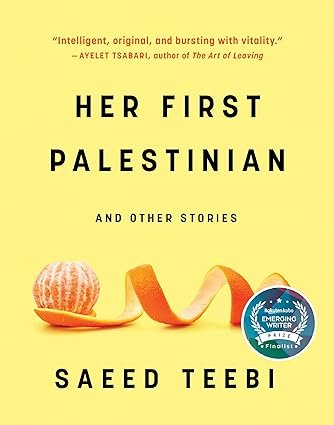Saeed Teebi’s collection of short stories, Her First Palestinian, was published by House of Anansi Press in 2022, and we were lucky enough to read an advance copy of it. We’d say that now more than ever it is important to amplify the underrepresented and silenced voices of Palestinian people, but the truth is it’s always been important.
We’re honoured Saeed Teebi joined us for this Power Q & A.
Her First Palestinian by Saeed Teebi is available wherever books are sold.
Q: We found your book to be this gripping and exquisite collection of stories that dismantle the notion of the Palestinian people as a monolith while also being one that unifies, resounding as a reminder that we are closer to each other than the powers that seek to control us—two narrative forces that may seem to work to opposite ends but are actually so authentic to the human experience across time, culture, and religion: we all want, basically, the same things, but fear corrupts. It distorts. Were these opposing forces something you were conscious of as you were writing? Or were they something that manifested unconsciously, merely by the act of so closely exploring your characters and their stories?
A: In writing Her First Palestinian, I was consciously aware of — and acting to effect — one of those narrative forces you refer to, while comfortable that the other one would emerge on its own. The prevailing conception of Palestinians as a monolith is pervasive, and it’s not an accident. Flattening a people into negative uni-dimensional characteristics like ‘violent,’ ‘uncooperative,’ or ‘anti-Semitic’ is a good way of marginalizing them. And marginalizing Palestinians, and by extension their interests and aspirations, has become a nearly foundational concept of Western societies and their vested geopolitical interests (as they perceive them). If someone is marginal, you can toss them aside, them and their slogans.
So making sure my stories had a range of Palestinian characters (merely reflecting reality) was important, not to mention more interesting. With every story, I asked myself: “What different kind of person can I write about now?” Some of my characters are religious, some are licentious, some are apprehensive, some are reckless, some are traumatized, some are naive. But all are impinged on by the pressures of their identities and the locus of their existence. And you’re right that among the strongest of those pressures is fear. Fear of institutional power, fear of corrupt governments, fear of personal ostracization, or even just the fear of not being loved. The fear is well-earned given how often, in real life, it materializes into actual hurt.
Of course, although fear might be particularly acute for many Palestinians, it is hardly unique to them. I was never worried that my readers would recognize this same fear in their own lives, whether they are Palestinians or not. It’s among our most human feelings, especially in a time when we feel less and less in control of our lives and our outcomes. Ultimately, the main faith that I have in literature is that it illustrates the connections between us that we can’t help but have.
Saeed Teebi.
About Saeed Teebi:
Saeed Teebi is a writer and lawyer based in Toronto. His debut collection of short stories, Her First Palestinian, was a finalist for the Atwood Gibson Writers' Trust Prize, the Rakuten Kobo Emerging Writer Award, the Danuta Gleed Literary Award, and the Forest of Reading Evergreen Award. The title story “Her First Palestinian” was shortlisted for the 2021 CBC Short Story Prize. Saeed was born to Palestinian parents in Kuwait and, after some stops in the U.S., has lived in Canada since 1993. He is working on his first novel.



